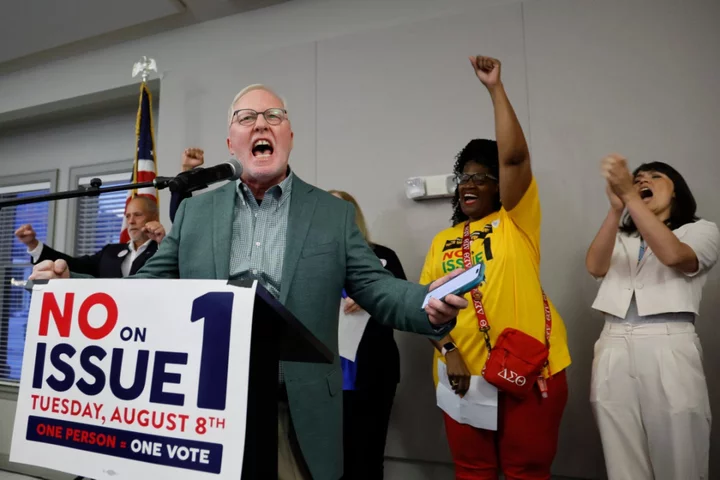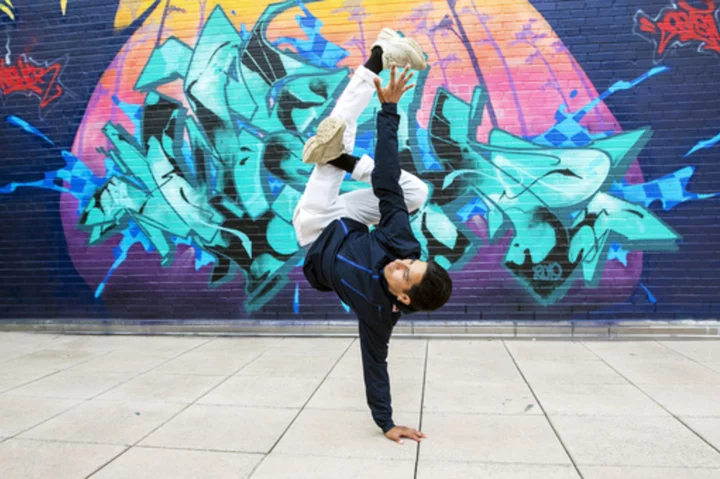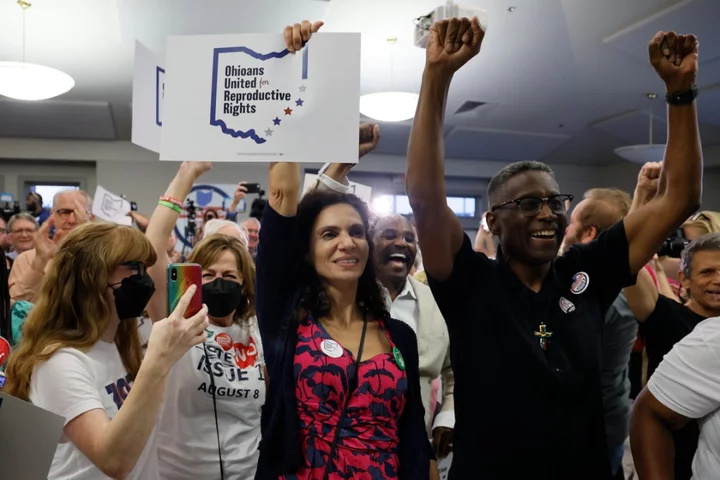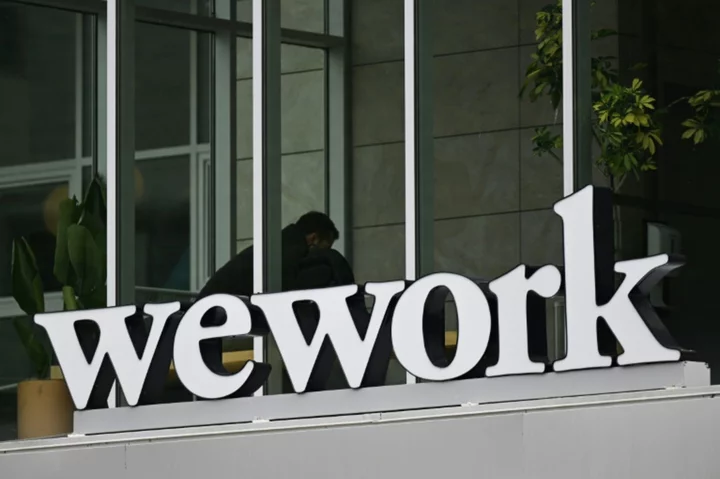
Ohio vote shows enduring power of abortion rights at ballot box, giving Democrats a path in 2024
Abortion wasn't technically on the ballot in Ohio's special election. But the overwhelming defeat of a measure that would have made it tougher to enshrine abortion rights in the state constitution this fall was the latest indicator that the issue remains a powerful force at the ballot box. The election saw heavy turnout for what's typically a sleepy summer election date and sets up another battle in November, when Ohio will be the only state this year to have reproductive rights on the ballot. It also gives hope to Democrats and other abortion rights supporters who say the matter could sway voters their way again in 2024. That's when it could affect races for president, Congress and statewide offices, and when places such as the battleground of Arizona may put abortion questions on their ballots as well. Democrats described the victory in Ohio, a one-time battleground state that has shifted markedly to the right, as a “major warning sign” for the GOP. “Republicans’ deeply unpopular war on women’s rights will cost them district after district, and we will remind voters of their toxic anti-abortion agenda every day until November,” said Aidan Johnson, a spokesperson for the Democratic Congressional Campaign Committee. The measure voters rejected Tuesday, known as Issue 1, would have required ballot questions to pass with 60% of the vote rather than a simple majority. Interest was unusually high, with millions spent on each side and voters casting more than double the number of early in-person and mail ballots ahead of the final day of voting as in a typical primary election. Early turnout was especially heavy in the Democratic-leaning counties surrounding Cleveland, Columbus and Cincinnati. Opposition to the measure, which became a kind of proxy for the November abortion vote, extended even into traditionally Republican areas. In early returns, support for the measure fell far short of Donald Trump’s performance during the 2020 election in nearly every county. The November ballot question will ask voters whether individuals should have the right to make their own reproductive health care decisions, including contraception, abortion, fertility treatment and miscarriage care. Ohio's GOP-led state government in 2019 approved a ban on abortion after cardiac activity is detected — around six weeks, before many women know they are pregnant — but the ban was not enforced because of the U.S. Supreme Court ruling in Roe v. Wade, which granted a federal right to the procedure. When a new conservative majority on the high court last year overturned the nearly 50-year-old ruling, sending authority over the procedure back to the states, Ohio's ban briefly went into effect. But a state court put the ban on hold again while a challenge alleging it violates the state constitution plays out. During the time the ban was in place, an Indiana doctor came forward to say she had performed an abortion on a 10-year-old rape victim from Ohio who could not legally have the procedure in her home state. The account became a national flashpoint in the debate over abortion rights and underscored the stakes in Ohio. Ohio is one of about half of U.S. states where citizens may bypass the Legislature and put ballot questions directly to voters, making it an option that supporters of reproductive rights have increasingly turned to since Roe v. Wade fell. After abortion rights supporters said they hoped to ask voters in November to enshrine the right in the state constitution, Ohio Republicans put Issue 1 on Tuesday’s ballot. In addition to raising the threshold to pass a measure, it would have required signatures to be collected in all 88 counties, rather than 44. The 60% threshold was no accident, abortion rights supporters say, and was aimed directly at defeating the Ohio abortion measure. Since Roe v. Wade was overturned, six states have had elections regarding reproductive rights. In every election — including in conservative states like Kansas — voters have supported abortion rights. In Kansas, 59% voted to preserve abortion rights protections, while in Michigan 57% favored an amendment that put protections in the state constitution. Last year, 59% of Ohio voters said abortion should generally be legal, according to AP VoteCast, a broad survey of the electorate. Last month, a poll by the Associated Press-NORC Center for Public Affairs Research found the majority of U.S. adults want abortion to be legal at least through the initial stages of pregnancy. The poll found that opinions on abortion remain complex, with most people believing abortion should be allowed in some circumstances and not in others. Opponents of the Ohio abortion question ran ads that suggested the measure could strip parents of their ability to make decisions about their child’s health care or to even be notified about it. Amy Natoce, spokesperson for the anti-abortion campaign Protect Women Ohio, called the ballot measure a “dangerous anti-parent amendment.” Several legal experts have said there is no language in the amendment supporting the ads’ claims. Peter Range, CEO of Ohio Right to Life, said he has been traveling across Ohio talking to people and “I’ve never seen the grassroots from the pro-life side more fired up to go and defend and protect the pre-born.” While the November question pertains strictly to Ohio, access to abortion there is pivotal to access across the Midwest, said Alison Dreith, director of strategic partnership for the abortion fund Midwest Access Coalition. Nine Midwestern states — Indiana, Iowa, Kansas, Ohio, Nebraska, Missouri, North Dakota, South Dakota and Wisconsin — are considered restrictive, very restrictive or most restrictive of abortion rights by the Guttmacher Institute, a research and policy organization that supports legal access to abortion. “Ohio in particular has always been a destination state for the states around it,” Dreith said. “If we don’t protect abortion access in Ohio, the options just continue to shrink for people seeking care in the Midwest.” Sri Thakkilapati, the executive director of the Cleveland-based nonprofit abortion clinic Preterm, said the effect of the Ohio vote will reverberate throughout the country. “When we restrict access in one state, other states have to take up that patient load,” she said. “That leads to longer wait times, more travel, higher costs for patients." Thakkilapati called the energy around abortion rights in last year's midterms “exciting.” But she said the media attention died down, and people quickly forgot “how tenuous abortion access is right now.” The special election and ballot measure in Ohio are “a reminder of what’s at stake," Thakkilapati said. “Other states are watching how this plays out in Ohio, and it may give anti-abortion groups in other states another strategy to threaten abortion rights elsewhere,” she said. “And for the majority who do want abortion access in their states but are seeing it threatened, the results in November could give them hope that the democratic process may give them relief.” Kimberly Inez McGuire, the executive director of Unite for Reproductive and Gender Equity, which focuses on young people of color under age 30, says the results of elections involving reproductive rights show that support doesn't come just from Democrats or in cities and states considered liberal bastions. “There was this idea that we couldn’t win on abortion in red states and that idea has really been smashed,” McGuire said. So, too, she said, is the “mythology” that people in the South and Midwest won't support abortion rights. “I think 2024 is going to be huge,” she said. “And I think in many ways, Ohio is a proving ground, an early fight in the lead up to 2024.” Dreith said that since abortion hasn't been on a major ballot since last year, the Ohio vote this fall is “a good reminder” for the rest of the country. “Abortion is always on the ballot — if not literally but figuratively through the politicians we elect to serve us,” she said. "It’s also a reminder that this issue isn’t going away.” Read More Ukraine war’s heaviest fight rages in east - follow live Charity boss speaks out over ‘traumatic’ encounter with royal aide Why Ohio's Issue 1 proposal failed, and how the AP called the race Ohio voters reject GOP plan to thwart upcoming abortion rights proposal Abortion rights advocates push for 2024 ballot initiative in Arizona
2023-08-09 23:50

Rising prices for travel yet to curb wanderlust
By Joanna Plucinska, Rajesh Kumar Singh, Doyinsola Oladipo and Priyamvada C LONDON/CHICAGO/NEW YORK (Reuters) -The post-pandemic travel boom and the
2023-08-09 22:51

Biden Decries Climate Threat But Does Not Declare Emergency
President Joe Biden stopped short of saying he would declare a national climate emergency, a move progressive lawmakers
2023-08-09 22:19

Prince Harry lauds the healing power of sports as he kicks off a promotional tour of Asia in Tokyo
Prince Harry has lauded the virtue of sports and its healing powers as he kicked off a promotional tour of Asia in Tokyo
2023-08-09 21:19

Rihanna breastfeeds baby RZA as she launches Savage X Fenty maternity wear
Rihanna has launched her first maternity wear line for her Savage X Fenty lingerie brand. The “Rude Boy” singer announced the range by modelling in one of her new nursing bralettes with her and A$AP Rocky’s one-year-old son RZA. She is also currently pregnant with their second child. Rihanna debuted her second pregnancy to the world while performing at the 2023 Super Bowl halftime show. Promotional images shared on the official Savage X Fenty Instagram page show Rihanna, 35, cradling RZA in her arms while she breastfeeds him. The pop star is seen beaming in each photo as she looks after her son. She wore her hair long and straight, with a straight fringe obscuring part of her eyes, and was styled in a black bralette. The caption reads: “Not ur [sic] mama’s maternity bras… Designed by Rihanna, approved by baby RZA.” According to US Vogue, the capsule collection features three new bralette styles and an oversized graphic T-shirt with a cheeky slogan that says: “Make more babies.” The bralettes are inspired by Savage X Fenty’s bestsellers and come in several colourways. The range includes the Savage X Cotton Maternity Bralette, the Floral Lace Maternity Bralette and the Savage Not Sorry Maternity Bralette. Each undergarment is designed for new and expecting mothers and enable them to hold their baby in one arm while fixing the bralette cup with the other hand in order to breastfeed with ease. They also feature a full nursing sling with a neckline to underarm opening, adjustable front-facing straps, and a set of nursing clasps. The back of the bralettes have a fourth row of clasps to allow for flexible adjustment throughout pregnancy. Sizes range from XXS to 4X, with prices starting from US$35 to US$60 (£27.46 to £47.08). Rihanna told the fashion magazine: “The new maternity capsule is about bringing that confidence and comfort to mums at every stage of their journeys. “I want to remind people that you can still channel sexiness and feel good while being a parent.” Last month, Rihanna modelled her brand’s new collection of sheer lingerie and showed off her growing belly. During the Super Bowl halftime show in February, the “We Found Love” singer revealed her baby bump in a full-red ensemble while putting on a show-stopping performance. Later, a representative confirmed she was indeed expecting her and A$AP’s second child. Her first pregnancy also came as a shock to fans, as she revealed her bare baby bump in a photoshoot after keeping it a secret for the first five months. The couple’s son’s name was only confirmed a year after his birth. A birth certificate, obtained by The Daily Mail, revealed that his name is RZA Athelston Mayers. Earlier this year, Rihanna spoke about how she became fiercely “protective” of her son’s privacy after photos of RZA were being potentially leaked to the press. She told British Vogue: “As parents it just feels so icky, like a violation.” Instead, the couple took control and sent candid photos of RZA to an unnamed blog and shared a video of the baby on TikTok. “It’s the thing you never want to happen… We get to decide as parents when and how we do that. End of story,” Rihanna added. Read More Wilko isn’t just a shop – it’s a magical portal to essential British tat Prince Harry’s ‘His Royal Highness’ title removed from royal family website Woman behind ‘not real’ plane tirade identified as marketing executive with $2m home
2023-08-09 19:58

Hip-hop and justice: Culture carries the spirit of protest, 50 years and counting
Hip-hop has been an integral part of social and racial justice movements
2023-08-09 18:47

Hip-hop turns 50, reinventing itself and swaths of the world along the way
In the five decades since hip-hop emerged out of New York City, it has spread around the country and the world
2023-08-09 18:21

Abortion rights advocates win major victory in Ohio as voters reject GOP plan to thwart ballot measure
Ohio voters have resoundingly rejected a measure that would make it more difficult to amend the state’s constitution, a proposal that Republican officials bluntly admitted was an effort to kneecap an upcoming ballot measure asking voters to enshrine a right to abortion care. That proposal has failed, with roughly 65 per cent of the vote tallied by Tuesday night after polls had closed, according to projections from the Associated Press. Issue 1 would have required that proposed amendments to the state constitution receive at least 60 per cent of the vote, raising the threshold substantially from a current simple majority vote. It also would have increased the minimum number of petition signatures that groups would have to collect before qualifying an issue to get on a ballot. The proposal’s failure means that a November referendum on abortion rights will need only 50 per cent of the vote to enshrine those protections into the state’s constitution, a major victory for abortion rights advocates and democratic campaigns in the aftermath of the US Supreme Court’s decision to strike down Roe v Wade. President Joe Biden called the measure a “blatant attempt to weaken voters’ voices and further erode the freedom of women to make their own health care decisions.” “Ohioans spoke loud and clear, and tonight democracy won,” he said in a statement. Within the last year, voters have also turned out in record numbers to protect abortion rights in California, Kansas, Michigan and Vermont, underscoring the overwhelming unpopularity of the Supreme Court’s decision and the volatile landscape for reproductive healthcare in its wake, while scrambling anti-abortion campaigns from Republican officials emboldened by the ruling. Issue 1 campaign Protect Our Constitution was largely supported by GOP mega-donor and Illinois businessman Richard Uihlein. A coalition of abortion right, civil rights and democratic advocacy groups joined a No On Issue 1 campaign. “Tonight was a major victory for democracy in Ohio,” the group said in a statement following projections of the measure’s defeat. “The majority still rules in Ohio, and the people’s power has been preserved – because Ohio voters showed up and overwhelmingly voted down Issue 1.” Ohio voters saw the proposal for “what it was: a deceptive power grab designed to silence their voices and diminish their voting power,” the group added. Kelly Hall, executive director of the Fairness Project, said the results mark an “incredibly profound and inspiring day for democracy”. “When faced with the choice of whether to allow politicians and special interests to consolidate power and strip voters of their rights, Ohioans fought back,” she said in a statement. “The defeat of Issue 1 should send a clear message to other extremist officials around the country that democracy will not die; people are ready to defend their rights against blatant attacks like Issue 1.” The upcoming proposal for a constitutional amendment in November will ask Ohio voters whether “every individual has a right to make and carry out one’s reproductive decisions.” After the Supreme Court’s ruling in Dobbs v Jackson Women’s Health Organization last June, Ohio lawmakers swiftly outlawed most abortion after roughly six weeks of pregnancy, a law that is currently suspended by a state court injunction but could be reinstated by the state Supreme Court. A vote to enshrine abortion rights in the state’s constitution would effectively overrule any such law. Abortion rights advocates and providers have warned that Ohio’s ban, which does not include exceptions for pregnancies from rape or incest, ignited a healthcare crisis that endangered patients and their families across the state, forcing people to seek care hundreds of miles out of state and navigate complicated legal and medical minefields while experiencing pregnancy complications. Ohio Republicans initially canceled August elections altogether, which have historically low turnout. But in May, they reversed that decision to put Issue 1 on the ballot – a decision that appears to have backfired for them. Nearly 600,000 Ohio voters cast their ballots early, with voters reporting busy polling locations across the state on election day. Read More Texas judge sides with women after harrowing testimony over anti-abortion law DeSantis won’t rule out national abortion ban but suggests there’s no ‘mileage’ left in Congress
2023-08-09 11:28

WeWork warns it might go out of business
Embattled office-sharing firm WeWork on Tuesday warned US regulators that it is worried...
2023-08-09 10:51

India’s Grain Stockpiles Are Key to Modi’s Pre-Election Strategy
Last year, Prime Minister Narendra Modi said India could feed the world. This year, the world’s top rice
2023-08-09 10:25

Abortion rights advocates push for 2024 ballot initiative in Arizona
Abortion rights advocates plan to ask Arizona voters to create a constitutional right to abortion
2023-08-09 06:25

The 10 Most Popular Wedding Songs
First dance songs, wedding reception songs … This list has a little of everything.
2023-08-09 06:15
